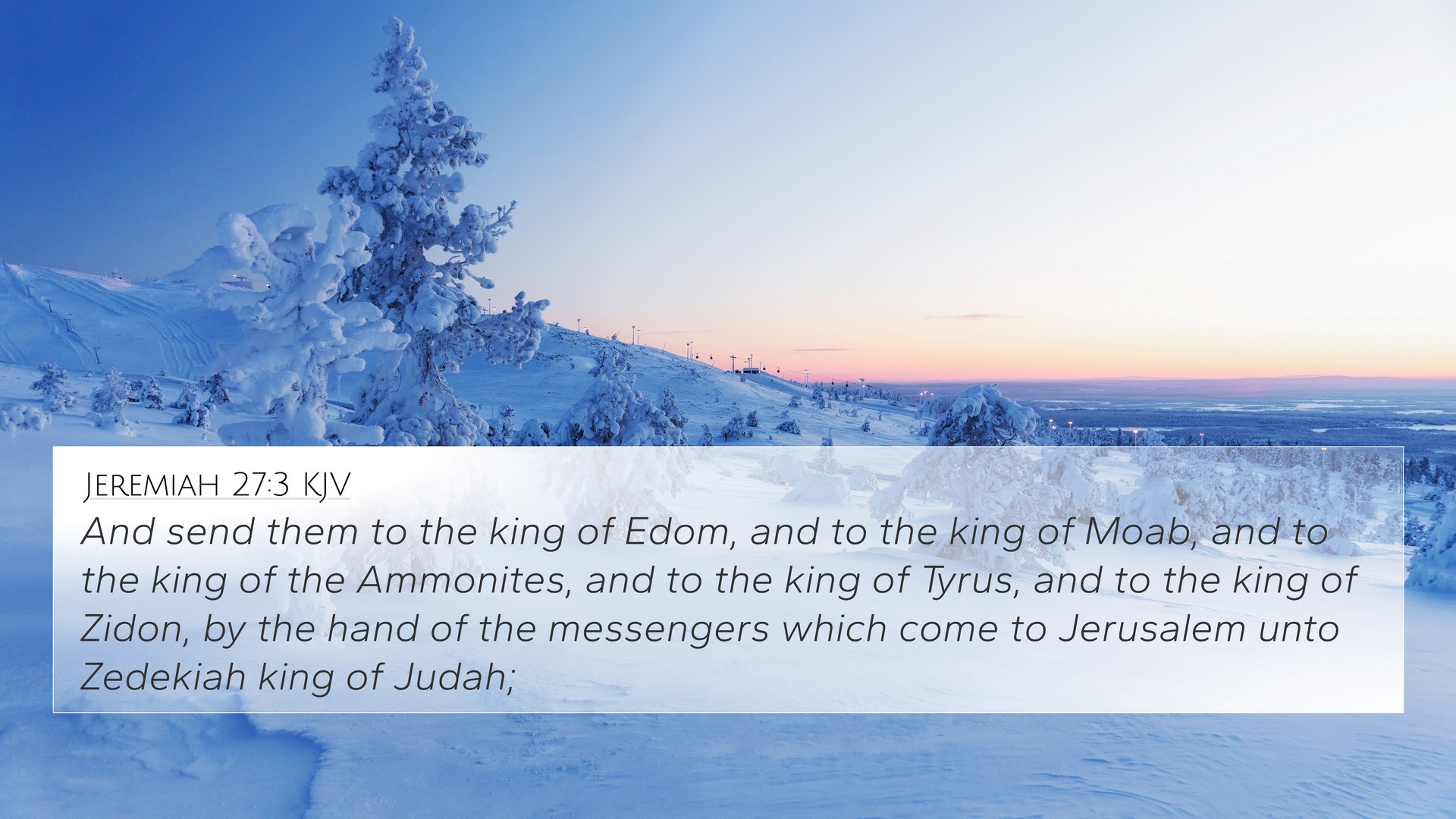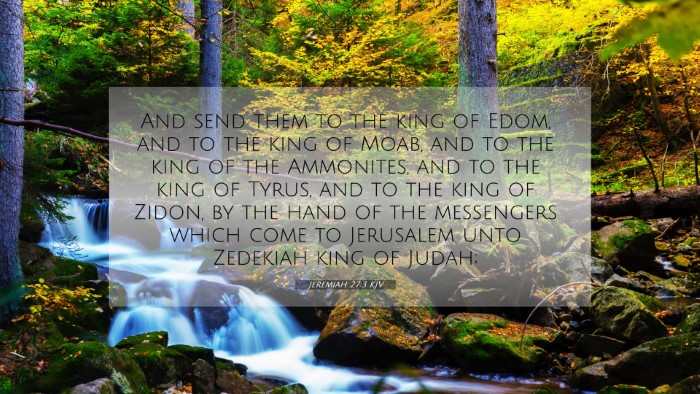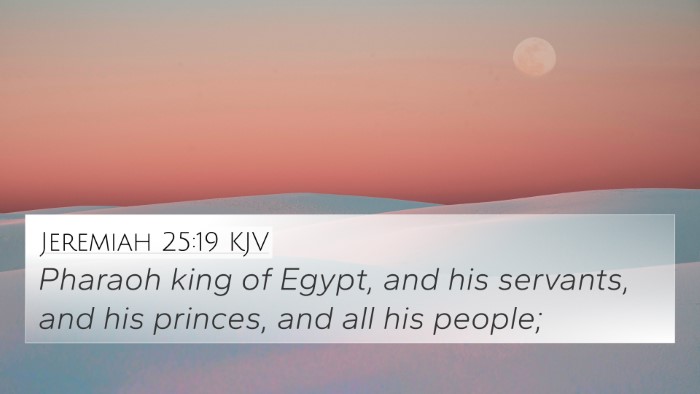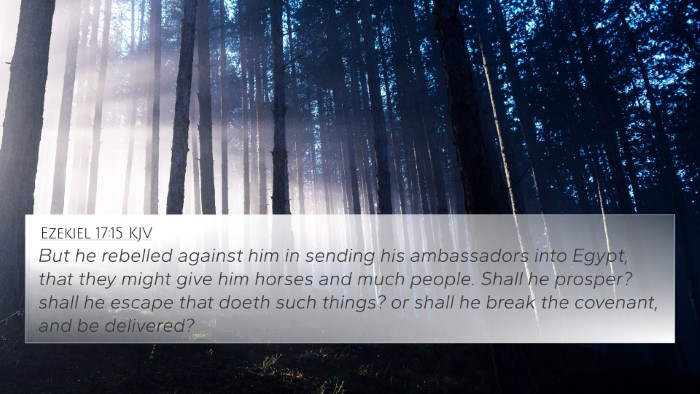Understanding Jeremiah 27:3
Jeremiah 27:3 reads: "And send them to the king of Edom, and to the king of Moab, and to the king of the Ammonites, and to the king of Tyre, and to the king of Zidon, by the hand of the messengers which come to Jerusalem unto Zedekiah king of Judah." This verse presents a directive from God through the prophet Jeremiah, emphasizing the importance of communication and warnings to surrounding nations during a time of upheaval.
Verse Meaning and Interpretation
The essence of this verse can be explored more deeply through public domain commentaries, including insights from Matthew Henry, Albert Barnes, and Adam Clarke. Here are combined interpretations from these commentaries:
-
Matthew Henry:
Henry explains that this message illustrates God’s authority over all nations, revealing that even neighboring countries, such as Edom and Moab, are included in divine plans. It serves to show that God’s sovereignty extends beyond Judah and that His will addresses international relations.
-
Albert Barnes:
Barnes emphasizes the strategic significance of sending such messages. These nations were called to hear the proclamation of God’s impending judgment against Judah, which ultimately links back to their own fates. His commentary suggests a warning to all nations to acknowledge God’s power and the consequences of ignoring divine counsel.
-
Adam Clarke:
Clarke provides a thorough analysis of the historical context of Jeremiah’s mission. He highlights the political intrigue and the significance of these letters sent to foreign kings as an attempt to align their responses to God’s message with Jeremiah's prophetic word.
Cross-References
This verse can be linked to several other Biblical passages that share thematic relevance, emphasizing God's sovereign communication and warnings through prophets:
- Isaiah 18:1-2: A proclamation highlighting the nations hearing God’s message.
- Ezekiel 33:7-9: A reminder of the prophetic role similar to Jeremiah's call to deliver messages of warning.
- Jeremiah 25:15-29: The overarching message of judgment upon nations, including those addressed in Jeremiah 27.
- Psalm 66:5: A call for peoples to observe what God has done, linking to the nations’ recognition of divine judgment.
- Zechariah 1:17: Provides insight into God’s concern for nations, relating to His actions in Jeremiah.
- Matthew 28:19: The Great Commission reflects God's desire for all nations to hear His Word.
- Acts 17:30-31: A New Testament reflection on God's command for all men everywhere to repent.
Bibliographic Connections and Thematic Analysis
The connections and themes represented in Jeremiah 27:3 are vital for understanding the broader narrative of Scripture. Through a comparative Bible verse analysis, these cross-references illustrate how God’s messages transcend time and context:
- Scriptural Cross-Referencing: By examining how God communicates through various prophets, the role of direct messaging develops. This communicates God’s continuous call to nations to heed His voice.
- Thematic Bible Verse Connections: Themes of judgment, prophecy, and divine sovereignty are consistently explored in passages that include Jeremiah, Isaiah, and the New Testament.
- Bible Concordance Usage: Resources such as Bible concordances can help identify other verses like Hebrews 1:1-2, supporting the idea of God speaking through messengers throughout history.
Conclusion
In summary, Jeremiah 27:3 acts as a pivotal verse that calls nations to listen to God’s prophetic warnings. Through the combined insights of respected commentators and the exploration of cross-referenced Biblical texts, one can gain a comprehensive understanding of the implications of divine communication, the interconnectedness of scripture, and the thematic relevance across both the Old and New Testaments.
For those interested in how to find cross-references in the Bible, utilizing tools like a Bible cross-reference guide can enhance understanding. These tools allow one to trace connections, fostering a deeper appreciation for the scriptural narrative and its expansive themes.









